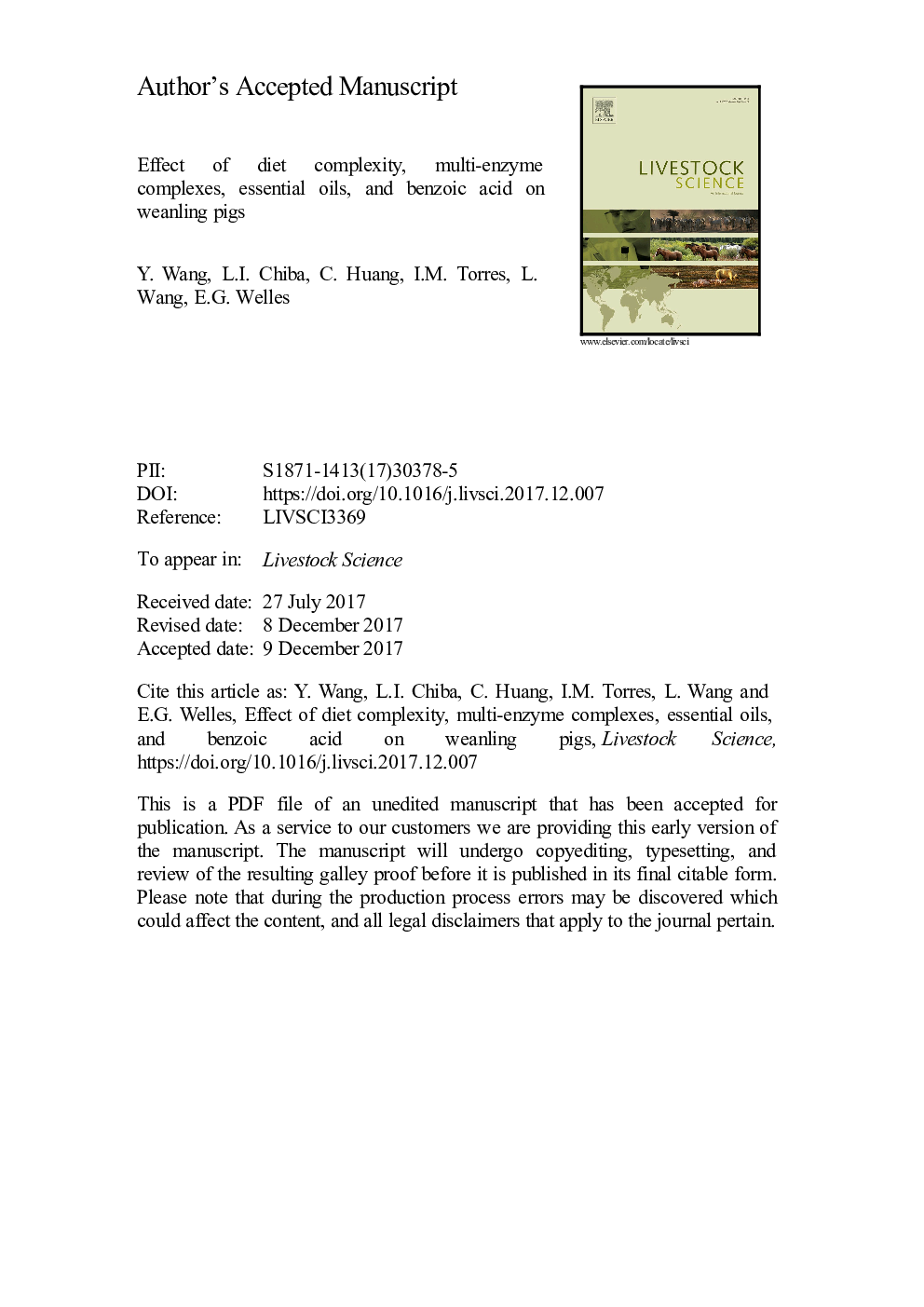| کد مقاله | کد نشریه | سال انتشار | مقاله انگلیسی | نسخه تمام متن |
|---|---|---|---|---|
| 8502026 | 1553923 | 2018 | 32 صفحه PDF | دانلود رایگان |
عنوان انگلیسی مقاله ISI
Effect of diet complexity, multi-enzyme complexes, essential oils, and benzoic acid on weanling pigs
ترجمه فارسی عنوان
اثر پیچیدگی رژیم غذایی، مجتمع های چند آنزیمی، اسانس های اساسی و اسید بنزوئیک بر روی خوک های زاد و ولد
دانلود مقاله + سفارش ترجمه
دانلود مقاله ISI انگلیسی
رایگان برای ایرانیان
کلمات کلیدی
خوک های شکارچی پیچیدگی رژیم غذایی، چند آنزیم پیچیده، روغن ضروری، اسید بنزوئیک
موضوعات مرتبط
علوم زیستی و بیوفناوری
علوم کشاورزی و بیولوژیک
علوم دامی و جانورشناسی
چکیده انگلیسی
The study was conducted to investigate the effect of supplementing a simple corn-soybean meal (SBM) diet with multi-enzyme complexes, essential oils, and benzoic acid on growth performance, serum metabolite profile, serum cytokines, and intestinal microbiota in weanling pigs. Forty-eight gilts and 48 castrated males weaned at 3 to 4 wk of age (initial body weight, 7.96 ± 0.89 kg) were randomly assigned to 4 dietary treatments with 3 gilt and 3 castrated male pens per treatment and 4 gilts or 4 castrated males per pen. A complex diet containing palatable and digestible ingredients was formulated (1.30 g standardized ileal digestible Lys/kg) to serve as the positive control (POS) diet. A simple corn-SBM, negative control (NEG) diet was formulated to be isolysinic to the POS diet, and the NEG diet was supplemented with multi-enzyme complexes (ENZ) or multi-enzyme complexes, essential oils, and benzoic acid (ALL). All diets were formulated to meet or exceed the 2012 NRC nutrient requirements of pigs weighing 7 to 25 kg. During the fourth week, blood samples were collected to determine serum metabolite profile and cytokines, and fecal samples were collected for the enumeration of bacteria. Pigs had ad libitum access to feed and water throughout the 4-wk study. From d 0 to 7 and 7 to 14, pigs fed the POS diet had greater feed and Lys intake (P < 0.05) and weight gain (P < 0.05) than those fed the NEG and ALL diets, but there were no differences in those response criteria between pigs fed the POS and ENZ diets. Weight gain of pigs fed the ENZ diet was 17% greater than those fed the NEG diet during the second week (P < 0.05), but it increased only numerically (16%) during the first week. Overall (d 0 to 28), pigs fed the POS diet consumed more feed, Lys, and digestible energy (DE; P < 0.05) and had greater weight gain (P < 0.05) than those fed the other diets. Dietary treatments had no effect on the efficiency of feed, Lys, or DE utilization for weight gain during the study. Serum total protein in pigs fed the ENZ and ALL diets was greater (P < 0.05) than those fed the POS and NEG diets. Pigs fed the ENZ diet had greater serum albumin (P < 0.05) than those fed the NEG diet. Serum globulin and urea N were lower (P < 0.05) and albumin to globulin ratio, glucose, and cholesterol were greater (P < 0.05) in pigs fed the POS diet than those fed the other diets. Dietary treatments had no clear effect on serum cytokines or fecal microbiota. Pigs fed the POS diet grew faster and had lower serum urea N and globulin and greater serum glucose and cholesterol than those fed the other diets. Although supplementation of the NEG diet with multi-enzyme complexes seemed to have beneficial effect on growth performance during the first 2 wk of the study, supplementation of the NEG diet with various feed additives had no clear effects. Further research is needed to explore further the possibility of using a simple corn-SBM diet for weanling pigs by supplementation with multi-enzyme complexes, essential oils, and benzoic acid.
ناشر
Database: Elsevier - ScienceDirect (ساینس دایرکت)
Journal: Livestock Science - Volume 209, March 2018, Pages 32-38
Journal: Livestock Science - Volume 209, March 2018, Pages 32-38
نویسندگان
Y. Wang, L.I. Chiba, C. Huang, I.M. Torres, L. Wang, E.G. Welles,
